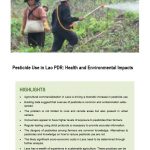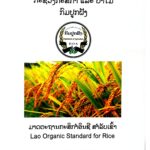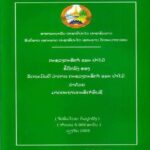
119 downloads
Title of document: Briefing Note “Pesticide Use in Lao PDR: Health and Environmental Impact”_Version Lao&English Authors: Sopavanh Rassapong, Chanthaly Syfongxay, Ianlang Phanthanivong, Bounlue Syhalad, Soubin Phimmahthut, Thongsern Manyvong, Bandith Keothongkham, Dr. Surat Hongsibsong, Annie Shattuck, Andrew Bartlett Journal’s name if any: Ministry/Government Agency/Organisation: RURAS, DTEAP Year of publication: 2018 Geographic focus: Lao PDR Main issues / topics addressed (for example: Increasing Pesticide Use; Food Safety; Public Health; Environmental Risks from Pesticides; Conclusions and Recommendations……) School of agroecology (if any): Web address to original document (if any): Summary: This Policy Brief is an output of the Sub Sector Working Group for Farmers and Agribusiness (SSWG-FAB). Data collection and analysis was supported by the Lao Upland Rural Advisory Service (LURAS), a program of SDC and MAF, implemented by Helvetas in partnership with the Department for Technical Extension and AgroProcessing (DTEAP). Read More

110 downloads
Title of document: Lao Organic Standard for Rice Authors/editor: DOA Journal’s name if any: Ministry/Government Agency/Organisation: DOA, MAF Year of publication: 2015 Geographic focus: Lao Main issues/ topics addressed (for example: …) School of agroecology (if any): Web address to original document (if any): Summary: Guideline for Lao Organic Standard for rice in Lao PDR Read More

106 downloads
Title of document: Decision of the Minister of Agriculture and Forestry on Organic Agriculture Standards Ministry/Government Agency/Organisation: Ministry of Agriculture and Forestry, Lao PDR Year of publication: 2005 Geographic focus: Laos - Referred to in Agriculture Law No.1/98 LNA, dated 10 October 1998; - Referred to in Prime Minister CB (DOA) No.89/PMO, dated 22 June 1999 on the Organization and Role of Ministry of Agriculture and Forestry; - Referred to in the joint ASEAN AFTA Agreement of Lao PDR; - Referred to in the joint WTO of Lao PDR. Read More
70 downloads
Title of document: Forestry Strategy to the Year 2020 of the Lao PDR Ministry/Government Agency/Organisation: Prime Minister Office, Lao PDR Year of publication: 2005 Geographic focus: Laos DECREE on Endorsement and Declaration of the Forestry Strategy to the Year 2020 of the Lao PDR: - Pursuant to the Law on the Government of Lao PDR, No. 02/NA, dated 6 May 2003 - Pursuant to the Forestry Law, No. 01-96, dated 11 Oct 1996 - With reference to the proposal of the Ministry of Agriculture and Forestry, No. 0163/MAF.05, dated 8 Jul 2005 Read More
137 downloads
Case study's fact sheet: Sacha Inchi Project Government: PAFO-LPB In practice since: 2013 Geographic focus: Laos School of agroecology: Agro-forestry >>> See on map Read More
37 downloads
Title of document: National Growth and Poverty Eradication Strategy (NGPES) Geographic focus: Laos The National Poverty Eradication Programme (NPEP) has been renamed by the Government of the Lao PDR in order to avoid confusion with the 8 national programmes and to better reflect its true substance. This decision was based on suggestions of the National Assembly and other national stakeholders. The new name adopted after internal consultations is the National Growth and Poverty Eradication Strategy (NGPES). The NGPES is the strategic framework under which all of the Government’s future growth and poverty eradication programmes will be developed and implemented. The NGPES is the result of a process that started in 1996 when the 6th Party Congress defined the long-term development objective as freeing the country from the status of least-developed country (LDC) by 2020. Read More
56 downloads
Title of document: Agroforestry Systems for Upland People in Lao PDR: Production, Benefit, and Farmers’ Satisfaction Analysis Authors: THIPPHAPHONE DOUANGSILA; SUPAPORN POUANGCHOMPU Ministry/Government Agency/Organisation: Faculty of Agriculture, Khon Kaen University, Thailand Year of publication: 2012 Geographic focus: Laos School of agroecology: Agro-forestry With an increasing population and governmental land-use restriction, shortened fallow periods of some traditional farming systems have contributed to the reduction of agricultural production in the uplands of Lao P.D.R. In response, systems which integrate trees, crops, and/or animals, such as agro forestry have been applied. However, the promotion of agroforestry as an alternative choice for upland farmers has become very challenging as a result of long-term economic incentives. The objectives of this study were to identify agroforestry systems employed, cost and returns, and the satisfaction of farmers, aiming to promote more benefits of agroforestry. Information described in this paper came from a survey of 80 agroforestry farms under a project support in nine villages of two northern districts. The results implied that three main agro forestry systems, based on nature components, have been employed. 81 percent of farmers employed Agrisilviculture, where trees and crops were combined in the same parcel. 14 percent applied Agrosilvopastoral (trees, crops, and pasture/animals), followed by 5 percent who applied Silvopastoral (trees and pasture/animals). In terms of production cost, initial investment in Agrisilviculture cost on average US$ 575 ha-1; while Agrosilvopastoral farmers spent around US$ 795 ha-1 and Silvopastural farmers, an estimated US$ 282 ha-1. After three-years of establishment, most farmers achieved success meeting their food sufficiency needs and obtained additional income from extra production, with average returns from each system about US$ 186 ha-1, US$ 632 ha-1, and US$ 104 ha-1 respectively. With biological and economic advantages produced by natural components in each system, most of farmers were similarly satisfied. Although the systems could not provide immediate-profitable returns, they were able to sustain food production and were profitable for a long-term use. A particular attention and continual technical support from relevant agencies are still required to enhance application of agroforestry. Read More
26 downloads
Case study's fact sheet: HUAYSORN‐HUAYSUA AGRICULTURE DEVELOPMENT AND SERVICE CENTER Supported by: Royal King Project Thailand In practice since: 2005 Geographic focus: Laos School of agroecology: Integrated Farming >>> See on map Read More
107 downloads
Title of document: Towards an agroecological transition in Southeast Asia: Cultivating diversity and developing synergies Authors: Jean-Christophe CASTELLA; Jean-François KIBLER Organisation: GRET; AFD ABOUT THE STUDY Starting from the early 1990s, a multitude of national and regional initiatives have emerged in the Great Mekong Sub-Region for supporting ecological intensification of agriculture or agroecology. The French Agency for Development (AFD) has been a very active supporter of these initiatives, especially in relation to the promotion of Conservation Agriculture and the establishment of the Conservation Agriculture Network for South East Asia (CANSEA). In addition to its initial focus on Conservation Agriculture and with the objective of widening the scope of agroecology by including all other “schools” such as Organic Agriculture, Agroforestry, Integrated Pest Management, System of Rice Intensification…, the AFD commissioned a study to better understand regional and national agroecology dynamics and initiatives, their strengths and weaknesses as well as the main issues at stake for their large scale dissemination. The authors conducted this study in 2013 in the six countries of the GMS, through a review of the literature combined with country based consultation workshops in Cambodia, Laos, Myanmar and Vietnam and expert surveys in Thailand and Yunnan-China. This publication aims at sharing some of the study’s key findings, and at providing a broad, yet non-exhaustive, overview of the current situation of agroecology in the Great Mekong Region. ABOUT THE AUTHORS Jean-Christophe CASTELLA is a geo-agronomist from IRD, seconded to CIRAD and based in Lao PDR. Over the past two decades, he has worked in the Mekong region on agrarian changes and their impacts on landscapes and livelihoods. Contact: [email protected] Jean-François KIBLER is an agro-economist from GRET with 20 years’ experience in rural development. He has coordinated a number of development projects in Cambodia, Lao PDR and Myanmar. Contact: [email protected] Read More

22 downloads
Title of document: Fair Trade Laos Authors: Journal’s name if any: Ministry/Government Agency/Organisation: Fair Trade Laos Year of publication: Geographic focus: Lao PDR Main issues / topics addressed (for example: Fair Trade Lao and main activities, Benefits, Challenging……) School of agroecology (if any): Web address to original document (if any): Summary: Fair Trade Laos is a nonprofit organization, established in 2008 with an aim to contribute to poverty alleviation, especially among vulnerable people, through productive resources and fair employment, and in harmony with improved social and environmental standards Presentation for Introduction "Fair Trade Laos" Read More

 Asia & Mekong Region
Asia & Mekong Region  Cambodia
Cambodia  Laos
Laos  Myanmar
Myanmar  Other
Other  Vietnam
Vietnam